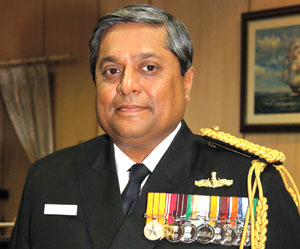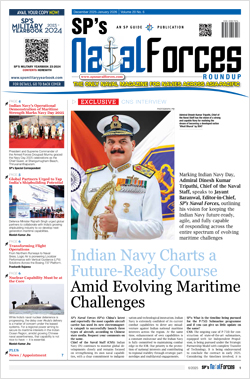INDIAN ARMED FORCES CHIEFS ON OUR RELENTLESS AND FOCUSED PUBLISHING EFFORTS

The insightful articles, inspiring narrations and analytical perspectives presented by the Editorial Team, establish an alluring connect with the reader. My compliments and best wishes to SP Guide Publications.

"Over the past 60 years, the growth of SP Guide Publications has mirrored the rising stature of Indian Navy. Its well-researched and informative magazines on Defence and Aerospace sector have served to shape an educated opinion of our military personnel, policy makers and the public alike. I wish SP's Publication team continued success, fair winds and following seas in all future endeavour!"

Since, its inception in 1964, SP Guide Publications has consistently demonstrated commitment to high-quality journalism in the aerospace and defence sectors, earning a well-deserved reputation as Asia's largest media house in this domain. I wish SP Guide Publications continued success in its pursuit of excellence.
- Global Partners Urged to Tap India's Shipbuilding Potential: Rajnath Singh at Samudra Utkarsh
- All about HAMMER Smart Precision Guided Weapon in India — “BEL-Safran Collaboration”
- India, Germany deepen defence ties as High Defence Committee charts ambitious plan
- G20 Summit: A Sign of Global Fracture
- True strategic autonomy will come only when our code is as indigenous as our hardware: Rajnath Singh
- India–Israel Joint Working Group Meeting on defence cooperation to boost technology sharing and co-development
Interview
Substantial fleet augmentation prime objective

Vice Admiral Anil Chopra, AVSM, NM, Director General Indian Coast Guard in a forthright interaction with SP’s Naval Forces delineates the roles, responsibilities and goals of the force even as it enhances its capabilities to address emerging threats
SP’s Naval Forces (SP’s): You assumed command of the Indian Coast Guard (ICG) immediately after the 26/11 carnage in Mumbai. What has been your role in revamping the coastal surveillance and security system to prevent recurrence of such incidents?
Director General ICG (DG ICG): Coastal security has occupied centre stage post the Mumbai attacks. The use of the sea route by terrorists for this attack highlighted the vulnerability of our coastline, and the pressing need for a coordinated approach to maritime security by all the stakeholders and users of the sea.
The coast guard has been active and at the forefront in analysing, proposing, discussing and obtaining the Government of India’s clearances on the very many mea-sures implemented post 26/11 for enhancing coastal security.
Besides a major thrust on acquisition of assets and recruitment of manpower, there has been vastly increased focus on enhanc-ing awareness of the maritime domain and patrolling in territorial waters by all concerned agencies. The Coastal Police of States has been trained by the coast guard in, inter alia, basic seamanship and boat handling and have commenced patrolling of shallow water areas. Further, security of all minor and major ports has been brought into focus.
The coast guard is also conducting regu-lar exercises on coastal security in coordina-tion with other central and state government agencies, to revalidate Standard Operating Procedures, check preparedness level of the resource agencies, and to impart experi-ence to the agencies involved in coastal security. We are also implementing a “Coastal Surveillance Network”.
SP’s: Has the growth and development of ICG been adequate to effectively counter the increasing challenges and threats ema-nating from sea frontiers in varying forms?
DG ICG: The ICG is equipped with a wide inventory of assets to undertake surveillance of the Exclusive Economic Zone. These include Advanced Offshore Patrol Vessels, Offshore Patrol Vessels, Fast Patrol Vessels, Inshore Patrol Vessels, Interceptor Boats / Craft, and Air Cushion Vehicles. The air arm of the coast guard includes Dornier fixed-wing aircraft, Chetak helicopters and the indig-enous Advanced Light Helicopters.
However, some of these assets have reached the end of their operational life. There is also a measure of asymmetry of both material and human resources available to the coast guard vis-à-vis the quantum of responsibilities vested with the organisa-tion. Substantial fleet augmentation has thus become our prime objective to ensure ade-quate security. In fact, we are working towards doubling of the fleet in five years and a three-fold increase in force levels by the year 2022.
Attracting manpower to man these augmented force levels will also be a chal-lenging task. All possible options are being exercised to attract suitable talent into the coast guard service.
SP’s: Post Mumbai 26/11, the Government of India has approved wide ranging changes in the maritime and coastal security domain. How do you visualise the capabili-ties of ICG to assume those enhanced roles and responsibilities?
DG ICG: Post 26/11, the ICG has been vested with additional responsibility for coastal secu-rity in territorial waters, and for coordination between all central and state agencies. The keyword here is “coordination”. Capability enhancement is aimed to be achieved through networking and coordination. All agencies will contribute to patrolling efforts in territorial waters in a coordinated manner and so also the response. Every agency is working on asset acquisition programmes with the knowl-edge of all other agencies, which will augment the collective efforts in due course on a con-tinuous basis. An integrated network is being established for electronic surveillance all along the coast and the recognised maritime picture will be available with all participating agen-cies. The “hub and spoke” concept, with the ICG functioning as the hub, forms the basis of inter-agency information exchange under the Coastal Security Scheme approved by the Ministry of Home Affairs. Standard Operating Procedures for operational coordination of coastal security have been formulated. The ICG has increased Community Interaction Programmes, wherein, our personnel interact regularly with the coastal fishing populations with a view to sensitise them and act as eyes and ears for any illegal activity at sea.
SP’s: While setting up of Maritime Security Advisory Board and appoint-ment of Maritime Security Advisor stands approved by the Government of India, yet there are indefinite delays in setting to work the revamped mechanism. What in your view are the factors withholding the implementation?
DG ICG: The issue of setting up a Maritime Security Advisory Board and appointment of Maritime Security Advisor is being dealt with by the Indian Navy, and I am not in a position to either comment or elaborate on the pro-posal.
SP’s: Elaborate upon the broad contours of additional responsibilities assigned to the ICG under the recently approved schemes.
DG ICG: The ICG has been ‘additionally designated’ as the authority responsible for coastal security in territorial waters. Under the new designation of Commander Coastal Command, the DG ICG is required to coordi-nate with all central and state agencies in all matters relating to coastal security. Directives from the government also call upon all agen-cies including the coast guard to enhance surveillance in territorial waters.
The coordination function is being fulfilled through various means such as regular infor-mation exchange, establishing working level relationships at all levels amongst all partici-pating agencies, conduct of periodical meet-ings and exercises, and adoption of Standard Operating Procedures for routine patrols and incident response with mutual consent. So far as enhanced surveillance is concerned, inten-sified vigil is expected to be achieved through both enhanced deployments and electronic surveillance. Marine Police in all the coastal states have been trained by the coast guard in seamanship and boat handling, amongst other subjects. The coast guard is also assisting the state governments in assessing the vulner-abilities of the coastline, so as to decide on the establishment of additional coastal police sta-tions with a view to enhance coastal security.
SP’s: Force development and force accre-tion has a long gestation period for acquir-ing commensurate infrastructure and assets. Within the given timelines what innovative measures are being adopted to acquire requisite capability for ICG?
DG ICG: At the outset it needs to be under-stood that “innovative” measures are not permissible in the procurement process. Nevertheless, while laid down procedures are meticulously followed by the ICG, a sustained effort is being made to ensure that each stage is progressed in the least possible time, so as to shrink the overall timeline for acquisitions. I would like to add that considerable effort is dedicated to all the acquisition projects so that they fructify in a time bound manner.
SP’s: Enumerate on the details of approved schemes for coastal surveillance and secu-rity. What would be the likely schedule for acquiring the infrastructure, assets and equipment?
DG ICG: Under the “Coastal Security Scheme” approved by the Government of India, all coastal states and island territories are required to activate Marine Police Stations along the entire coastline to provide gap-free coverage in their area of jurisdiction. The Ministry of Home Affairs has sanctioned funds under this scheme for activation of each coastal police station along with necessary support infrastructure in terms of boats, vehi-cles, communications and office equipment. The required manpower is being recruited and provided by the coastal states.
The coast guard is implementing a “Coastal Surveillance Network”, viz., a chain of static sensors along the coastline and in the island territories to ensure adequate and effective electronic surveillance of the entire coast.





